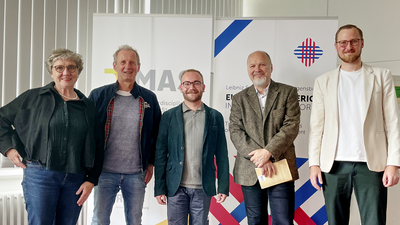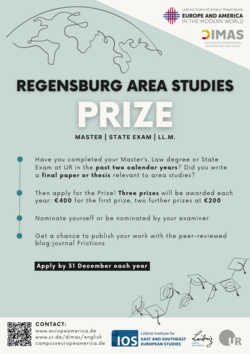
Area Studies Prize
Regensburg Area Studies Prize: Master | Staatsexamen | LL.M.
Promoting Area Studies Research and Teaching in Regensburg
Call for Entries open until 31.12.2024! Jetzt bewerben?�Cbis 31.12.2024!?
Ausschreibung: Deutsch?|?Call for Entries: English?|?Flyer DE?|?Flyer EN
The Leibniz ScienceCampus Europe and America together with?DIMAS?offers a Prize for Outstanding Master's Theses in Area Studies at the University of Regensburg. The prize was inaugurated in 2000, then in partnership with CITAS, to promote the development of research and teaching with relevance to area studies in the fields of social sciences, humanities, law and economics.
Area Studies explores culture, language, politics, history, and environmental issues, as well as economic, social and legal systems and practices, in both various large-scale regions of the world and smaller-scale regions. The interdisciplinary and multidisciplinary approaches employed in the field can be applied to the study of a single area or used to produce comparisons between spaces. North America, Latin America, and Eastern, Southeastern, Western and Southern Europe, as well as the relations between these regions, form the focus of area studies research and teaching at the University of Regensburg. We particularly encourage applications from students who have explored relations, transfers, entanglements and interconnections between different regions.
The prize recognizes students�� outstanding academic achievements, while also promoting area studies as a focus of research and teaching at the University of Regensburg. The prizewinners will receive a certificate and the prize money. Up to three prizes (a first prize of 400 �, two equal second prizes of 200 � each) will be awarded for final papers and theses submitted as part of master��s degrees, degrees in law or teaching degrees (Masterarbeiten, Zulassungsarbeiten or Studienarbeiten �C BA theses will not be considered). As well as prize money, the winners also have the chance to publish in the?Blog-Journal Frictions. Two winners of the prize in the inaugural edition,?Jana St?xen?and?Melanie Hussinger, have published aspects of their master��s thesis in contributions to the blog. More details on the previous winners of the Regensburg Area Studies Prize can be found below.

Applications are welcome from any students who completed a teaching, law or master��s degree in relevant programs based in the Faculties of Law, Economics, Catholic Theology, Human Sciences (formerly PPS), Philosophy, Art History, History, and Humanities (PKGG), and Languages, Literature, and Cultures (SLK) in the previous two years. Students can nominate themselves for the prize or be nominated by their thesis supervisor(s).
The annual deadline for applications is 31 December. Applications are welcome from graduates who completed their master's theses, or equivalent, and graduated in the past two calendar years.The call for graduates from 2023 and 2024 is now open!
Photo by Dr Tanja Wagensohn (UR). Felix Bruckner (centre) with his supervisors Prof. Dr J?rg Skriebeleit to the left and Prof. Dr Marek Nekula to the right. On the very right, Tizian Dick, winner of one of the second prizes. On the left, Natali Stegmann, co-supervisor of Miriam M?hner, winner of the other second prize for 2023 (she was unable to attend in person).
DIMAS
Vorstand | Board: Prof. Dr. Anna Steigemann and Prof. Dr. Rike Kr?mer-Hoppe
Gesch?ftsf��hrung | Manager: Dr. Laura Niebling
Sekretariat | Secretary dimas@ur.de
Tel. +49 941 943 5966
Tel. +49 941 943 68537 and
Tel. +49 941 943 68527



